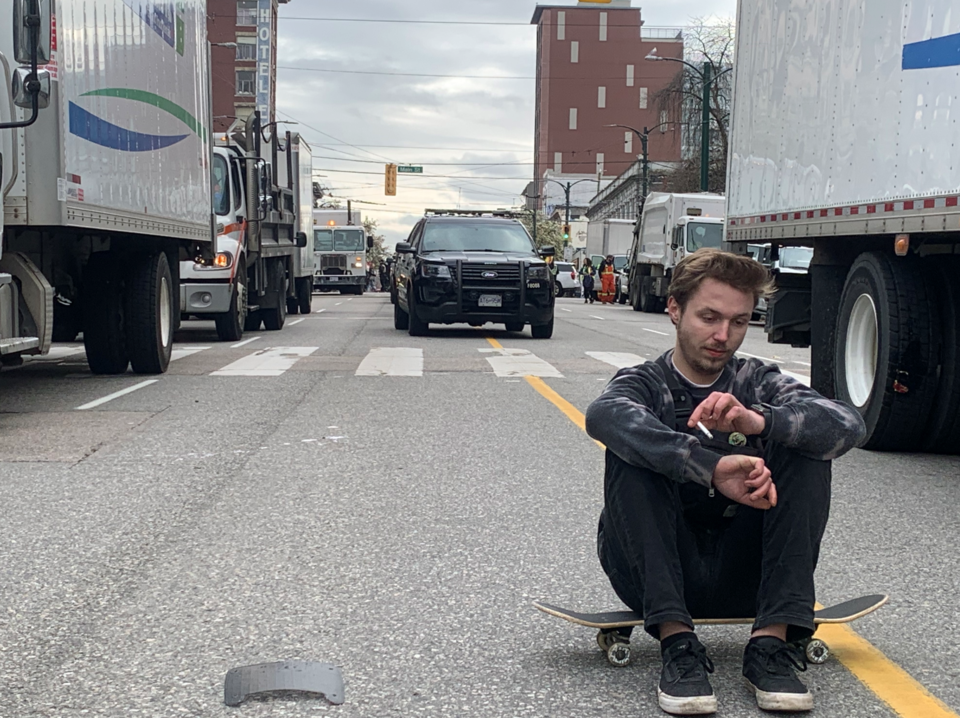B.C.’s human rights commissioner has launched an inquiry into police use of exclusion zones during activities such as the April removal of the tent city on the streets if Vancouver’s Downtown Eastside.
Commissioner Kasari Govender said the inquiry’s goal is to shine a light on how police use exclusion or restriction zones to restrict observation of police action — actions which could affect the human rights of marginalized populations.
“Shining a light on these issues will help the commissioner determine where recommendations can be made to prevent human rights violations and maximize freedom of the press to safely gather needed information,” Govender said.
Govender said the inquiry would focus on the exclusion of media when the Vancouver Police Department (VPD) aided in the removal of people's tents and belongings that lined some of the cities sidewalks.
Several members of the media complained VPD officers excluded them from the stretch of East Hastings Street between Main and Carrall streets.
Glacier Media was at the scene early and . Glacier’s reporter did leave the blocked off area once and was challenged by police on attempting to cross police lines. That reporter asserted their rights and went through police lines. They were later challenged by an inspector and again asserted their rights to observe and report.
A second Glacier Media reporter later arrived at the scene and was conducted through the area by an officer.
“When police may potentially come into conflict with some of society’s most marginalized people during a police operation, allegations of media being excluded or restricted from reporting on those operations raise serious red flags and merit investigation,” Govender said.
“The B.C. public rely on the media to gather and publish information, including on any potential human rights violations. The press plays a key role in our democracy and the protection of human rights.”
Police say short-term restrictions were for safety
VPD spokesman Sgt Steve Addison said access to the area was restricted in the first hour, including when large vehicles and heavy machinery were being moved into the encampment zone.
“In these moments, members of the media and the public were asked to remain behind a perimeter line. During those brief restrictions, media and members of the public continued to have clear sightlines toward the work taking place,” Addison said.
“Once safety concerns were addressed, we immediately took steps to facilitate full and unfettered media access throughout the encampment zone,” he said.
“This access was reflected in extensive reporting from within the encampment zone that show reporters moving without restriction as the process was taking place.”
Addison said within minutes of officers moving into the area, the VPD reached out to media to facilitate access.
“We invited a television pool camera and a reporter into the encampment zone to immediately begin reporting on the start of the decampment. We obtained assurances that the television pool camera and reporter would share their reporting with television agencies that were not present,” Addison said.
Addison said the VPD also established a media staging area to coordinate access for other reporters who wanted to enter the encampment zone and had personnel on the ground to help guide reporters into the staging area.
“We support press freedom, and we took proactive measures to ensure there would always be robust media access to the Hastings Street Encampment Zone during the decampment process,” Addison said.
Police board dismissed earlier complaint
In November, the Vancouver Police Board dismissed a complaint about the use of media exclusion zones during the decampment.
B.C.’s police complaint commissioner, however, has said it appeared the VPD created an “exclusion zone” to keep the public and media away from stepped-up enforcement action to clear East Hastings of tents and structures.
Clayton Pecknold said he came to that conclusion after reading concerns raised by a complainant and public statements made by the VPD regarding the April 5 mobilization of in the Downtown Eastside.
“After review of the concerns raised in the complaint and the public statements of the VPD, it appears that an ‘exclusion zone’ was created by the VPD for the purpose of excluding the public and the media from a specific section of the city for a defined period of time,” Pecknold wrote to Faye Wightman, the vice-chair of the Vancouver Police Board.
Governder’s inquiry seeks to answer questions including:
- reasons why some media and observers were excluded or restricted;
- why traffic cameras were shut off from 9:00 to 9:45 a.m. during the Hastings Street decampment on April 5, 2023;
- whether the shutdown of traffic cameras complied with human rights standards; and,
- whether the creation of the exclusion/restriction zone complied with law and protections for freedom of the press.

